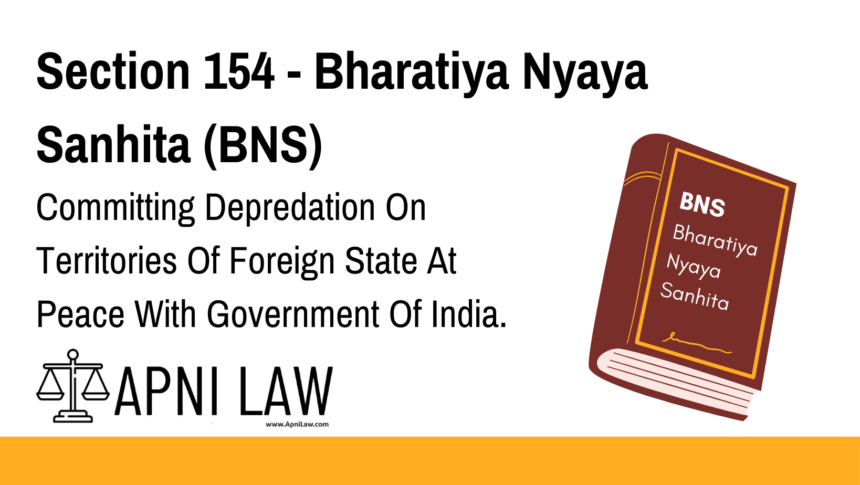Code – Section 154 BNS
Whoever commits depredation, or makes preparations to commit depredation, on
the territories of any foreign State at peace with the Government of India, shall be punished
with imprisonment of either description for a term which may extend to seven years, and shall
also be liable to fine and to forfeiture of any property used or intended to be used in
committing such depredation, or acquired by such depredation.
Explanation of Section 154 BNS
What is Depredation?
Depredation refers to plundering, looting, or causing destruction in the territory of a foreign state. This could involve acts of violence, theft, or damage to infrastructure.
Key Elements of Section 154 BNS
- Act of Depredation:
- Physically committing depredation (plundering, looting, destruction).
- Preparing to commit depredation, even if the act is not completed.
- Foreign State Must Be at Peace with India:
- The provision applies only when India has friendly relations with the concerned country.
- If the foreign state is at war with India, different legal provisions may apply.
- Punishment:
- Imprisonment up to seven years.
- Fine may be imposed.
- Forfeiture of property used or intended for the crime.
Illustrations of Section 154 BNS
Example 1: Armed Raids on Foreign Land
A group of individuals enters a neighboring country and loots villages, destroys properties, and takes valuable assets. This act qualifies as depredation under Section 154 BNS.
Example 2: Cross-Border Smuggling and Theft
An organized group crosses into a foreign country and steals resources such as livestock or industrial goods. Even if they are caught before completing the act, they can still be charged under this section.
Example 3: Vandalism and Destruction of Property
A militant group enters a peaceful neighboring country and destroys public infrastructure like roads, bridges, and government buildings. This is a clear case of depredation.
Example 4: Planning an Attack (Punishable Even Without Execution)
Even if an individual or group only plans to commit depredation but is caught before executing it, they can still be prosecuted under this section.
Common Questions and Answers on Section 154 BNS
1. What does “depredation” mean under this section?
Depredation refers to acts of plundering, looting, or destruction in foreign territories. This includes:
- Destroying property in another country.
- Looting resources from foreign land.
- Using violence or force to seize control of assets in a foreign state.
2. Can a person be punished even if the depredation did not occur?
Yes. Even if only preparations were made to commit depredation, the accused can still be punished under Section 154 BNS.
3. What happens to the property used in depredation?
The law allows the forfeiture (confiscation) of property used or intended to be used in committing depredation. This can include:
- Weapons or tools used in the act.
- Vehicles used for transportation.
- Money or assets obtained through depredation.
4. How is this different from waging war against a foreign state?
- Section 153 BNS deals with waging war against a friendly foreign state.
- Section 154 BNS focuses on depredation (plundering or destruction) in foreign territory.
5. Can cybercrimes be considered depredation?
While Section 154 BNS primarily covers physical acts, cyber depredation (hacking, cyber-attacks on foreign infrastructure, financial fraud, etc.) could be interpreted under this section if they cause significant harm.
Conclusion
Section 154 BNS ensures that Indian citizens do not engage in violent or destructive acts in foreign territories, preserving diplomatic relations and international peace. By imposing strict penalties, it discourages cross-border crimes and maintains India’s commitment to peaceful coexistence with other nations.
For more legal insights, visit ApniLaw today! 🚀











